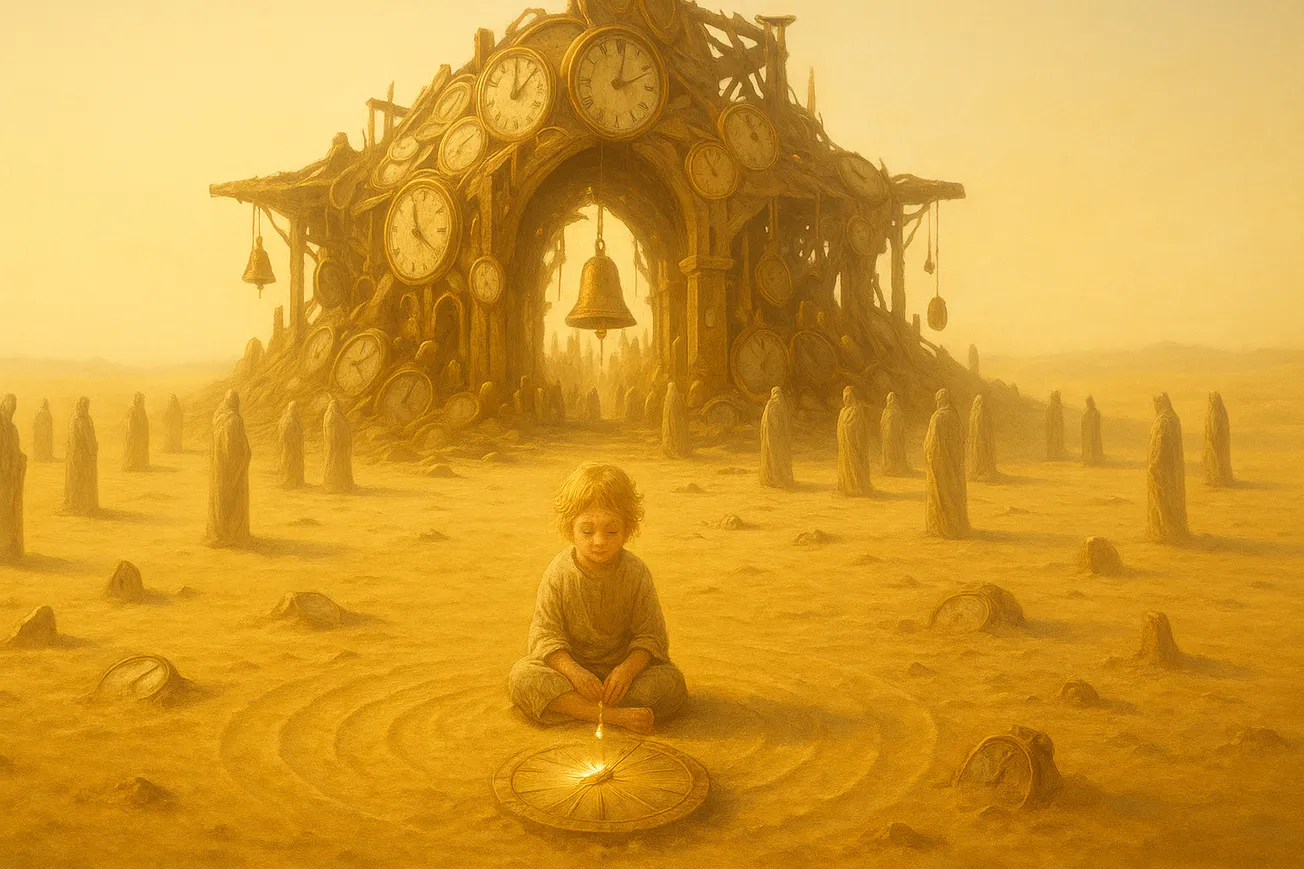🌈 The Fractal Story Engine | Time & Reality | (14) TR-003-D2
In a desert where no shadows moved and the sky forgot to dim, a man once called a horologist knelt beside a crater of glass and ash. His fingers, cracked from heat and solitude, pressed fragments of brass into the cooling earth. He did not look up as the bells behind him rang without rhythm. He had long ago stopped asking what hour it was.
This was the Temple Where Time Forgot Its Name.
He had built it from remnants: shattered chronometers, melted watchbands, rusted pendulums, bell towers dragged from fallen cities. Some pieces had been offered by pilgrims. Others he had found in his dreams, laid beside his sleeping body like relics gifted by unseen hands.
The desert gave no markers. No sunrise to predict. No moonrise to chart. But sometimes, the wind changed direction, and that was enough.
They came, one by one. Pilgrims. They carried nothing. No offerings, no prayers. Only the silence of those who had stopped measuring themselves. They did not speak to him, and he did not ask why they came. Some stood in the dust for hours. Others waited for days, even after their skin began to peel. The Temple gave nothing but stillness. That was its blessing. And its test.
One morning that had no beginning, he felt it. A presence, not behind, not before, but beside. A child. Small, barefoot, with hair like scorched wheat and eyes that reflected nothing. No shadow trailed them. No name arrived in the horologist’s mind. The child simply was.
The bells did not ring. The clocks did not stir. But the wind curled differently around the child, and the sand seemed unsure whether to rise or rest.
The horologist offered no welcome. Only a glance, and the movement of his hand pressing another shattered cog into the altar floor. The child watched, then stepped past him into the heart of the temple, where a circle of bells hung on broken chains like teeth pulled from time.
There, the child sat cross-legged. Silent. Breathing slowly.
The others began to gather. Drawn not by the horologist’s rituals, but by something older. They encircled the child without words, without hierarchy. Some wept, though they did not know why.
And then, it happened.
A tear, singular and luminous, slid from the child’s eye and fell onto the stone below. Where it touched, the floor grew warm. A gear long buried beneath the dust shifted, not forward, not backward, but inward.
One of the bells shivered. Not a ring, not a chime, just the suggestion of sound remembering its shape.
The horologist dropped the piece in his hand. His knees buckled, not from awe, but from recognition. He had seen this before, in a forgotten dream of his mother’s voice counting stars. In the moment before he first broke a clock to understand how it moved. In the silence between his father’s last breath and the minute hand’s next motion.
The child’s tears continued, slow and unhurried. Each one rewrote a sliver of the temple. Not as it had been, but as it had always waited to be. A pillar straightened. A bell uncracked. A sundial, long useless, began to glow faintly, not with light, but with permission.
The clocks did not resume their ticking. They began to pulse. A rhythm without units. A time that did not divide.
Some pilgrims collapsed in the sand, overcome by a memory that had never occurred but belonged to them nonetheless. Others whispered names they did not know they had carried. The horologist crawled to the child’s side and knelt beside the small pool forming at their feet.
He did not ask who they were.
He only said, “I remember.”
The child took his hand, and for a moment, the entire temple pulsed with breath. A shared breath. A breath outside of time.
Beyond the dunes, the sky held its stillness, but something beneath the surface shifted. The bones of clocks stirred in their graves. Forgotten seconds blinked open like newborn stars. The world did not restart.
It began to listen.

